Discover top guides, trends, tips and expertise from AIO Writers
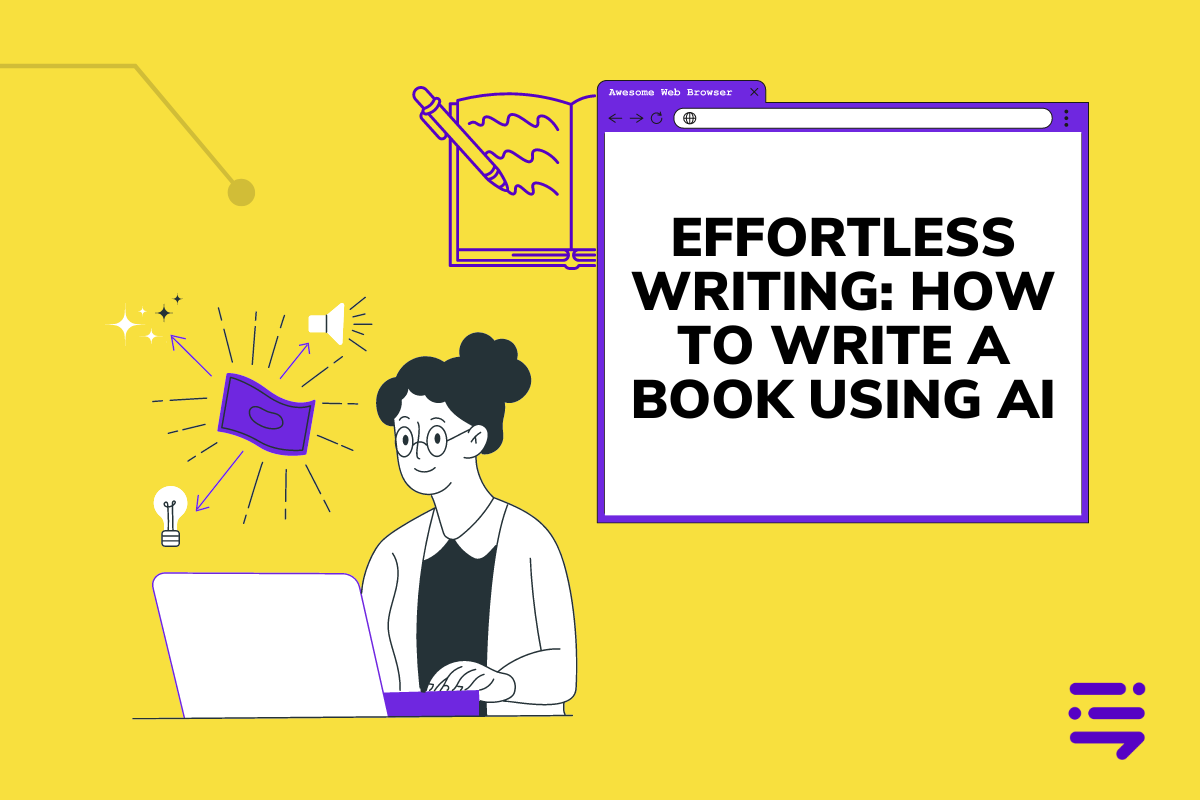
Imagine being able to churn out chapters while you sleep, or edit your novel during a lunch break. Sounds like the stuff of dreams, right?
Gone are the days when writing a book meant endless nights spent in front of a typewriter. Today’s writers can learn how to write a book using AI to streamline their creative process and transform raw ideas into polished prose.
AI writing tools have come a long way. From mere translators and grammar checkers back in the day, AI can now write a short story, generate content for social media, draft marketing copy, create book cover designs, and even compose full-length novels.
Since ChatGPT came out in 2022, AI writing tools have become the hottest thing in town. Now we have AI book writers sweeping the publishing world and transforming literature as we know it.
This guide aims to answer all your questions about AI writing — particularly how to write a book using AI.
We’ll delve into what AI can do for authors, as well as its limitations. We’ll also share practical steps on how to use writing software tools effectively.
Who knows? By the end of this journey, you might just have that gleaming first draft in your hands, a product of both you and AI.
Table Of Contents:
Can AI Write a Book?
You might be wondering, can artificial intelligence really write a book? Well, it’s not as far-fetched as you might think.
But let’s get one thing clear: AI isn’t about to pen the next great American novel. Yet.
AI is making strides in various fields, and writing is no exception. However, certain nuances make human-authored content stand out from its AI-generated counterparts.
ChatGPT, for example, has made waves with its impressive text generation capabilities. Given a prompt or an idea, it can produce pretty convincing text on almost any subject matter.
But remember this – although it may sound natural and coherent at times, ChatGPT cannot understand context like humans do.
Learn more about writing a book with ChatGPT.
So, can AI write a book?
The answer is yes.
But will it be indistinguishable from a human-authored one anytime soon?
Probably not.
Benefits of Using AI in Writing a Book
Just as artificial intelligence has become a game-changer in content creation, it also has the potential to transform the book publishing industry.
Speed and Efficiency
First off, it can save you a ton of time. AI is like your trusty sidekick that can churn out content much faster than you might be able to type it all out.
A simple draft might take weeks to perfect, but with an AI writing assistant by your side, those weeks could turn into mere hours.
Better Quality Content
Next comes quality content. An AI writing tool isn’t just about faster output — it also improves your writing style.
Your human brain might miss minor errors or inconsistencies but rest assured that AI won’t let anything slip through its digital fingers.
With the editing prowess of AI, it can catch grammar and spelling mistakes and even offer suggestions for improving sentence structure and overall readability.
Creativity Boost
Suffering from writer’s block? Not feeling it today? AI has got your back.
AI can generate ideas, suggest plot twists, and even help with character development. It’s like having a brainstorming buddy that never runs out of steam.
Plus, it can analyze trends and patterns, ensuring your story stays fresh and engaging.
AI-powered tools can analyze a wealth of information, spot trends, and formulate ideas based on those patterns.
Consistency
Another perk is the consistency that AI brings to the table.
AI doesn’t get tired or distracted. It can maintain a consistent tone and style throughout your book, creating a more cohesive reading experience.
Round-the-Clock Assistance
Last but not least: availability. Unlike humans who need rest to function properly, an AI tool is available round the clock for all your writing needs.
Of course, it’s not about replacing the human touch; it’s about enhancing it. You can collaborate with AI, fine-tune its suggestions, and add your unique flair. It’s like having a writing companion that amplifies your strengths and fills in the gaps.
So, if you’re looking to streamline your writing process, boost creativity, maintain consistency, and get a helping hand with editing, AI could be your literary ally.
Types of AI Tools for Writing
When it comes to AI tools for writing a book, there’s quite a variety out there, each doing something different to help you out.
First up, you’ve got your grammar and spelling checkers like Grammarly. These are like your trusty sidekicks for catching those pesky typos and grammar slip-ups.
Then, there are the language enhancement tools like the Hemingway Editor which polishes up your writing style, making it sound more coherent and professional.
Perhaps the most popular of them all are the content generators like BrandWell. These super smart “writers” can whip up text based on a topic or prompt you feed them. Whether it’s a blog post or a full-blown ebook, they can handle it.
Watch how BrandWell builds this 8,000-word ebook in just 25 minutes:
In the video above, our AI Director Jeff Joyce used the AIMEE chatbot to write a long-form ebook. BrandWell gives you another way to write a book with AI — using a specialized AI Agent.
These 40+ AI agents are custom-trained for specific industries or use cases such as social media posts, Amazon listings, pricing analysis, copywriting, finance reporting, and newsletter creation.
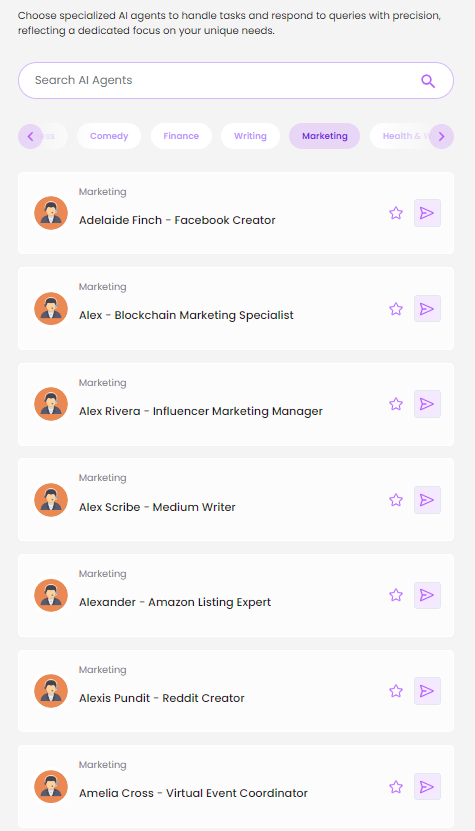

If you’re planning to use AI to write your next book, you can choose from any of these four agents to get your manuscript started:
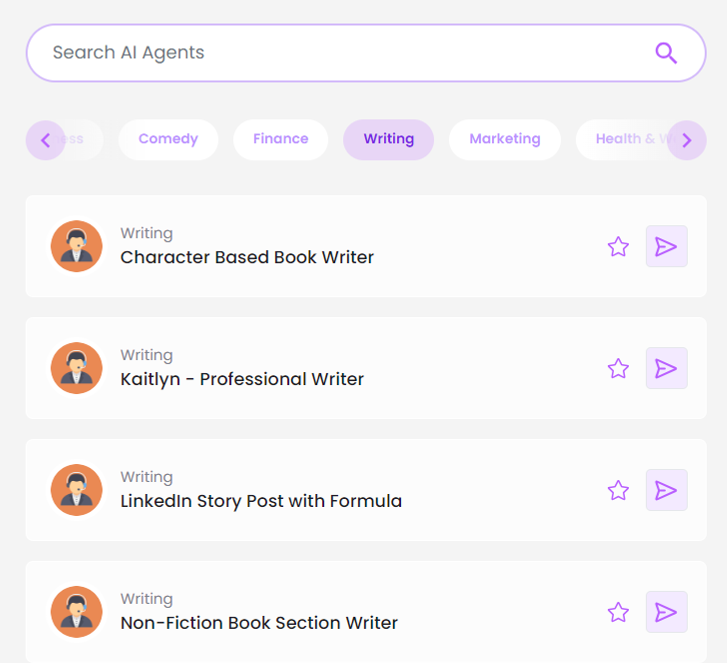

Beyond BrandWell, some of the best AI writers worth considering are:
Squibler
In addition to its impressive writing capabilities, Squibler facilitates easy collaboration with co-authors or editors on collective projects. The software also includes modern features such as dark mode and split screen options which enhance the overall writing experience.
The recently launched image generation feature enables writers to create visuals directly from the tool itself, adding another layer of convenience.
One standout aspect of Squibler is its ‘elements’ feature that provides a systematized approach to generating key narrative components such as characters and settings. This unique functionality aids authors in creating immersive scenes and chapters effortlessly while keeping track of all elements involved.
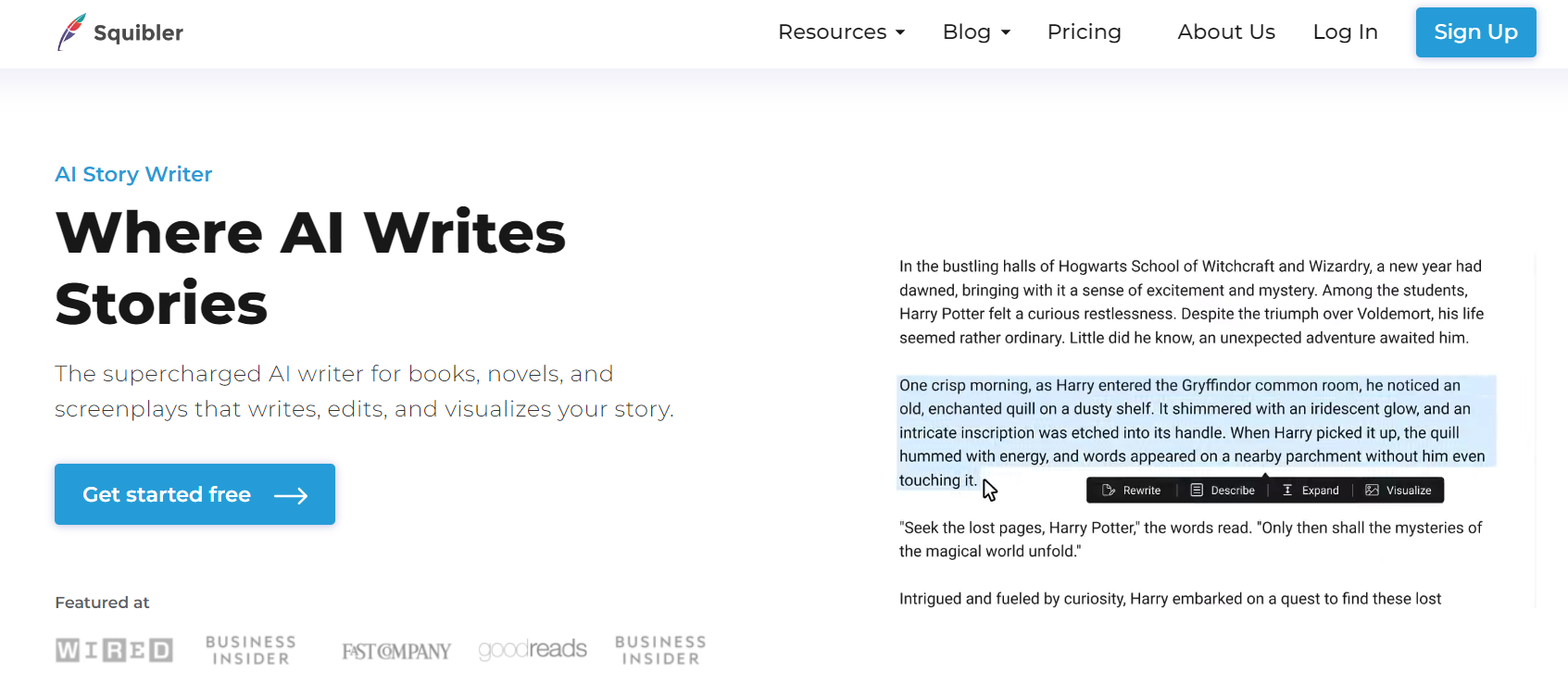

Simplified
Simplified’s advanced algorithms can help authors generate ideas and create outlines for their books. By understanding your inputs, it can provide suggestions that will spark creativity and enhance productivity.
The platform also excels at editing tasks. It checks grammar, spelling errors, and punctuation mistakes as well as offers stylistic improvements to ensure your book reads smoothly and professionally.
A crucial part of any good book is thorough research. With Simplified’s smart search feature, you don’t need to spend countless hours scouring through resources online or offline; the tool does it all by itself! This leaves more time for what truly matters: crafting compelling narratives.
Simplified provides valuable insights into reader preferences based on data analysis which helps writers understand their audience better and tailor content accordingly. These insights allow authors to make informed decisions about plot development, character creation or even choosing suitable genres for future projects.
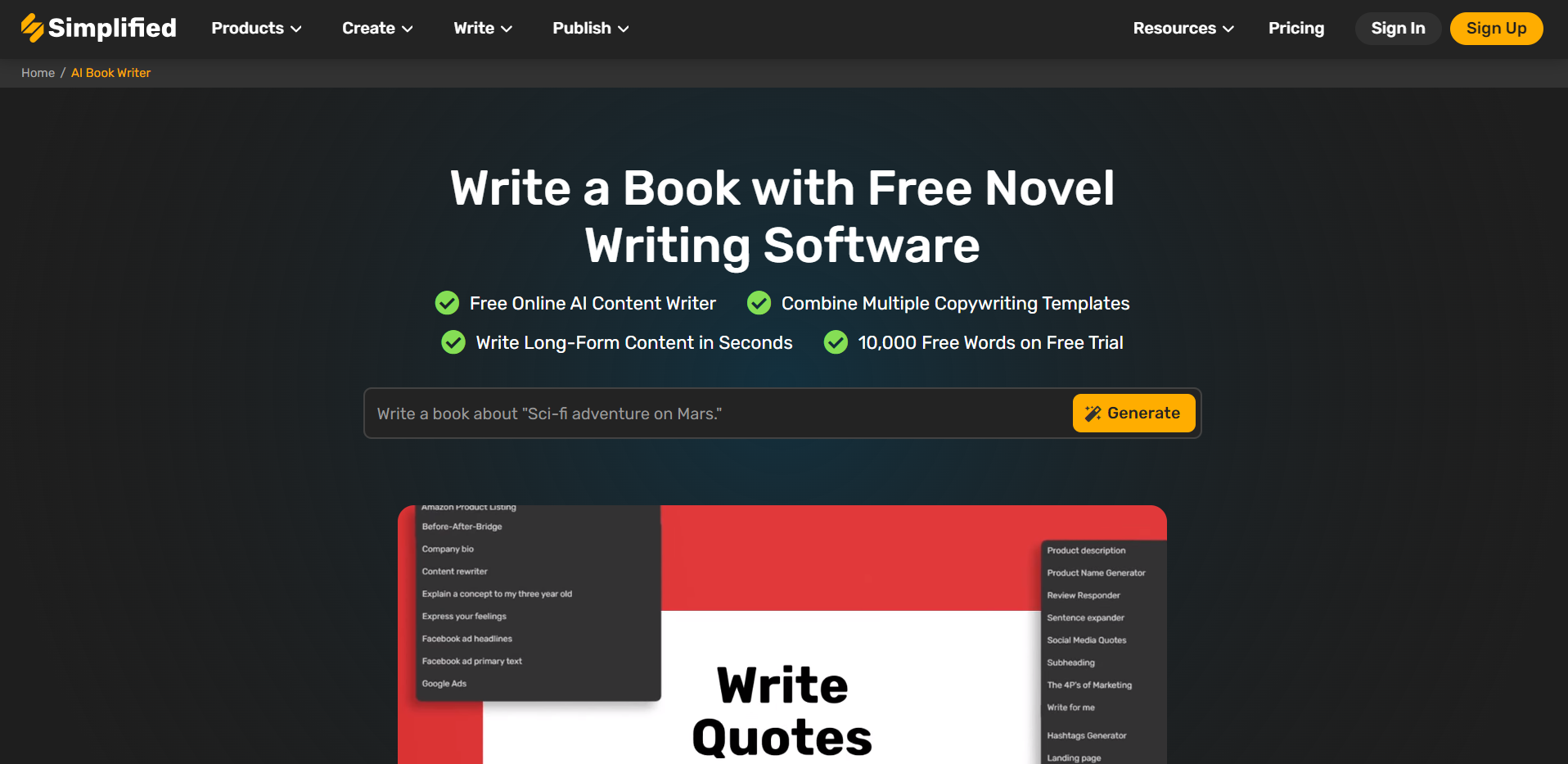

Neuroflash
If you’re an author looking to try AI writing, then Neuroflash might be just what you need. This innovative platform leverages AI technology to streamline and enhance various aspects of book writing.
The first key feature that sets Neuroflash apart is its data-driven approach to content creation. The system uses machine learning algorithms to analyze vast amounts of data from different sources, including books, articles, and social media posts. It then utilizes this information to generate unique content ideas based on trending topics or user preferences.
Another noteworthy feature is its semantic analysis capability. Neuroflash can understand the context behind words and phrases used in a text. This allows it not only to create coherent narratives but also to adjust its language style according to specific genres or audience demographics.
Apart from English, Neuroflash supports multiple languages when writing novels which makes it easier for authors who want their work translated into other languages without losing any contextual meaning or nuance.
Last but not least is its user-friendly interface designed with non-tech savvy users in mind. With clear instructions and intuitive controls, even beginners will find it easy to navigate through the platform’s features.
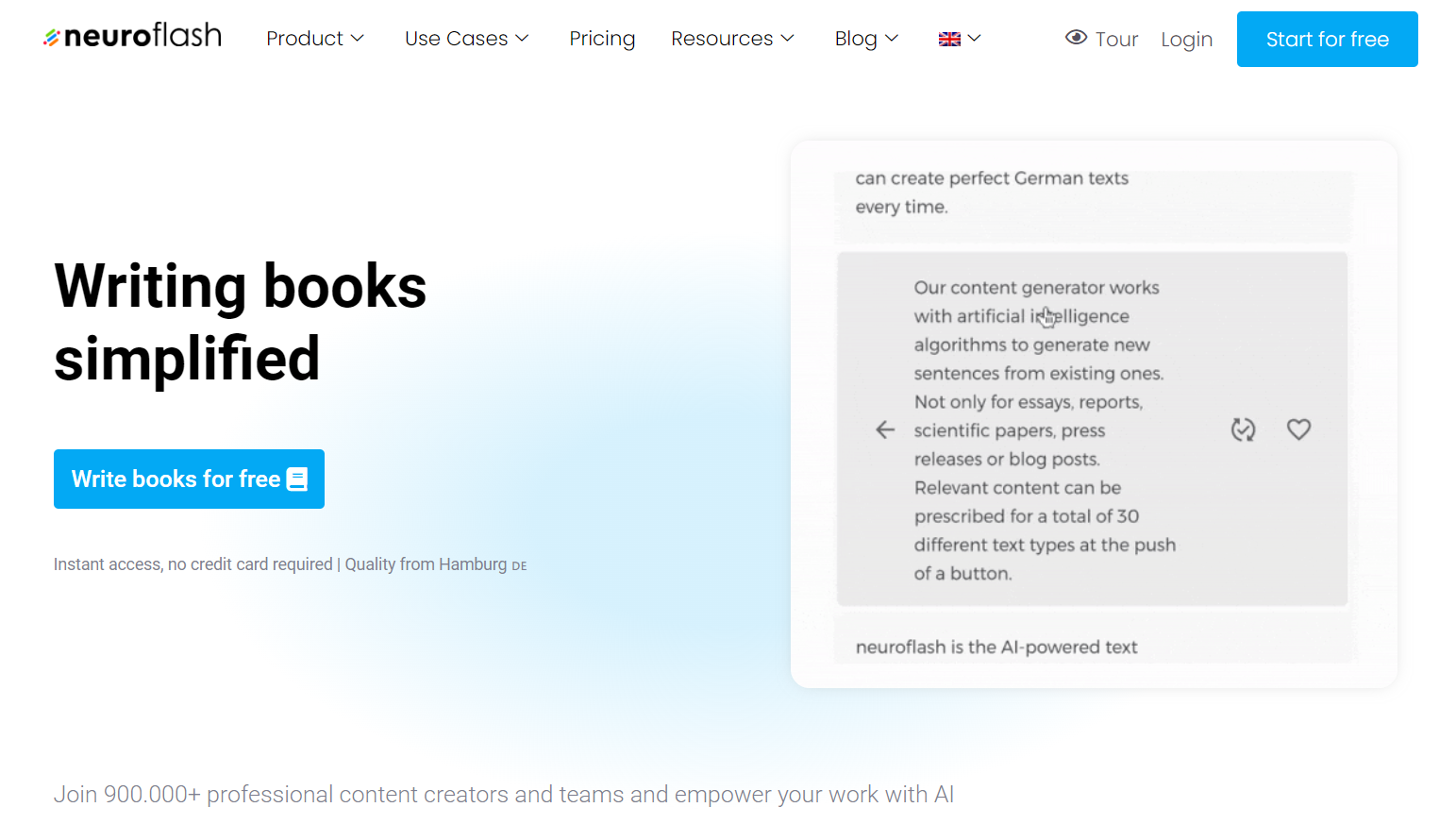

Sudowrite
If you’re a writer looking to enhance your creativity and productivity, then Sudowrite might just be the tool for you. This AI-powered writing assistant is designed to help authors write books more efficiently.
Sudowrite comes packed with features that can transform any writer’s process. Let’s explore some of them:
- Suggest Mode: This feature offers alternative ways to express what you’ve written, helping writers improve their prose. It provides different suggestions based on your input, allowing for enhanced creativity.
- Expand Mode: If you have an idea but are struggling to flesh it out, this mode is perfect for you. Simply type in a sentence or two about your concept, and Sudowrite will generate additional content that builds upon your initial thoughts.
- Outline Mode: The outline mode helps structure ideas by creating detailed outlines from rough notes. This can significantly streamline the planning phase of book writing.
In addition to these key features, Sudowrite also includes other tools such as Drafts, a feature that allows you to save and revisit your work at any time, and a distraction-free writing environment for focused creativity.
Whether you’re an experienced author or just starting your writing journey, Sudowrite offers a range of features designed to make the process easier, more efficient, and ultimately more enjoyable.
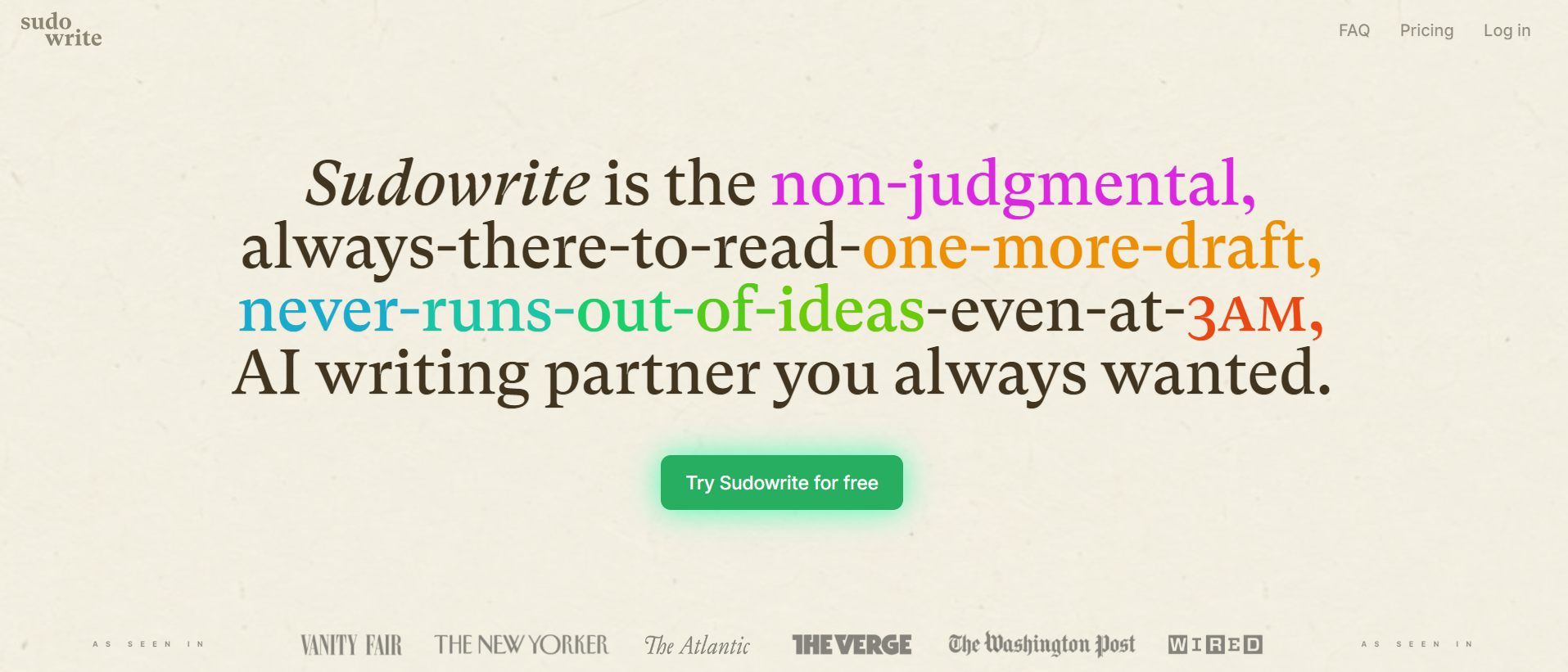

If you’re into foreign languages, there are AI tools for translation too which makes your writing accessible across different languages, though they do vary in how accurate they are.
Summarizers are great for condensing long texts into shorter, digestible versions without losing the key points.
Plus, SEO tools help optimize your content for search engines, suggesting keywords and making sure it’s all good to go.
There are also personalized writing assistants that learn from how you write and give tailored suggestions to improve your style. And for those who prefer speaking over typing, there are voice-to-text tools that transcribe what you say into written words.
Lastly, don’t forget the plagiarism checkers! They’re crucial for making sure your work is original and not accidentally borrowing too much from somewhere else.
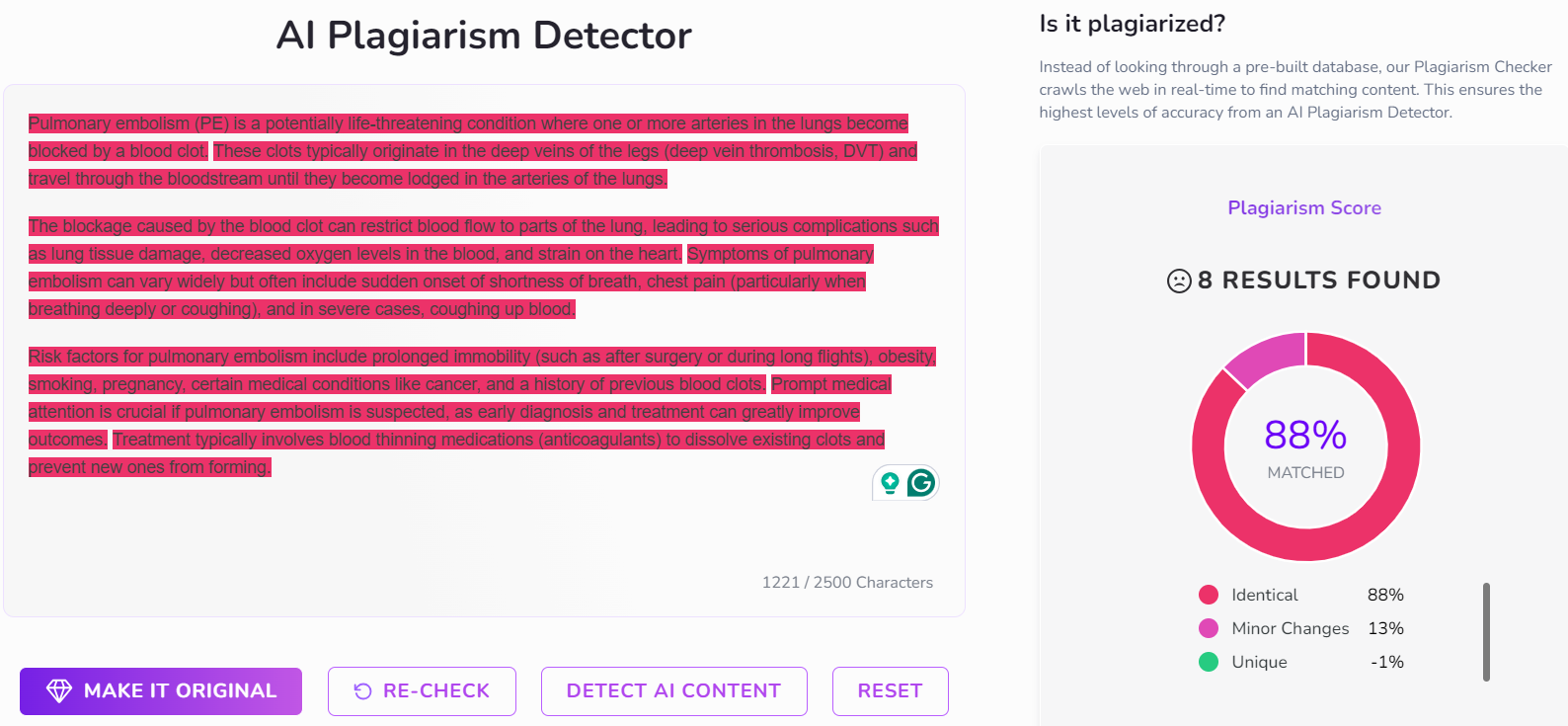

So, depending on what you need help with in your writing process, there’s probably an AI tool out there that can lend a hand.
Are AI-Written Books Any Good?
Let’s not kid ourselves, assessing the quality of books written by AI is no walk in the park. Let me help you navigate through it.
Literary Merit: Do They Hold Up?
When evaluating books written by AI, a key factor to consider is their literary worth. After considering the narrative, it’s essential to ascertain whether a book can captivate and maintain interest.
AI-written novels have shown us that algorithms can weave together plotlines that make sense and engage readers. So they pass this test.
Creativity: Are They Original?
Next up on our evaluation checklist is creativity. This one’s tricky because while an algorithm can certainly generate new text based on its training data, does it really create something unique or just mimic human writers?
Readability: Can We Understand Them?
Last but not least on our list is readability; how easy are these AI-authored texts to read and understand?
In general terms, readability depends upon sentence structure complexity and word choice among other factors – aspects that current-generation AIs seem quite adept at managing efficiently as seen with AI Dungeon, an interactive storytelling game.
Evaluating the quality of books written by AI isn’t as straightforward as you might think. Because while machines can produce technically proficient prose, there’s still a debate on whether they truly understand the nuances and emotions that make literature human.
How to Write a Book Using AI: Step-by-Step Guide
Now that you know the benefits of writing an entire book with AI, and you have a fairly good idea of how AI writing tools work, let’s bring your book idea to life.
How to write a book using AI involves several steps.
Step 1: Define Your Book’s Concept
Start by clearly defining the concept or theme of your book. This could be a fiction genre (like science fiction, fantasy, romance), a non-fiction topic (like history, self-help, business), or any other theme you’re passionate about.
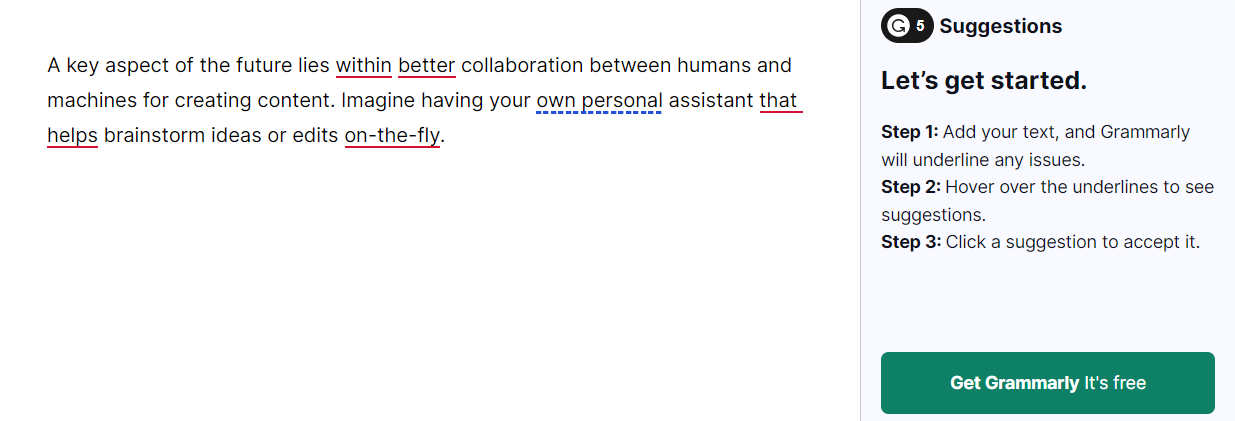

Step 2: Outline Your Book
Give your AI tool a structure to follow by creating a detailed outline for your book. This should include the main chapters or sections, key ideas for each, and how they connect to form a cohesive narrative or argument.
Or as you’ve seen in our video above, you can also let the AI build your outline for you!
Step 3: Input Your Book Details
Feed the AI with information. This could be anything from an existing manuscript, text prompts, or even random ideas you have in mind.
You can prompt the AI with specific requests, like “Write a dialogue between two characters about a secret” or “Explain the concept of blockchain in simple terms”.
AI can also help with creating character descriptions, setting scenes, or explaining concepts.
Step 4: Flesh Out Chapters
Use the generated text as a starting point and then refine it. Remember, no AI is perfect; some human touch will always be needed.
Note: This process might need repetition for every chapter depending on how detailed you want each section of your book to be.
Step 5: Edit and Refine the Content
Just like any other written work, editing is key when using an AI writer. A useful tool for this stage can be Grammarly or Hemingway Editor.
Review the AI-generated text for coherence, style, and relevance to your book’s overall theme. Make necessary edits to ensure consistency in voice and narrative flow.
Step 6: Incorporate Personal Insights and Experiences
To make your book unique and engaging, add your personal insights, stories, or experiences. This human touch is crucial to distinguish your work from being just a collection of AI-generated content.
Step 7: Gather Feedback
Share your first draft with trusted individuals for feedback. Use their critiques to make improvements.
You can also use AI to help rephrase or refine parts of your book based on this feedback.
Step 8: Format and Design
Once your content is finalized, use AI tools for formatting your book for publication. This includes deciding on the layout, font, and any illustrations or graphics of each page.
AI image generation tools can help with graphic designs and other types of artwork for your book.
I asked DALL-E to create a book cover for my earlier example and here’s what it drew for me:
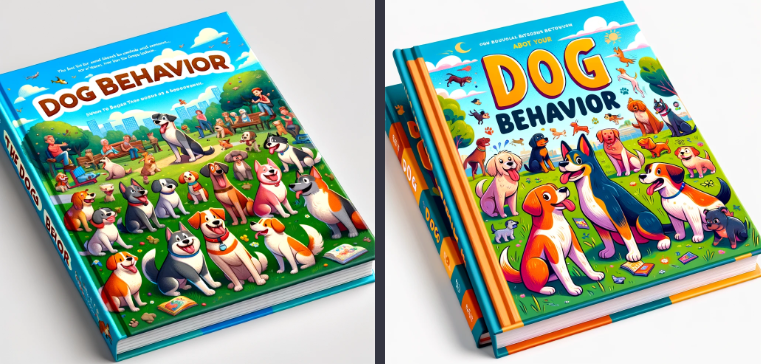

Step 9: Proofread
The AI might miss subtle nuances in language or create awkward sentences so always do a final proofreading of your book.
You can use AI tools for grammar and spell checks, but a human proofreader is recommended for a nuanced understanding of language and context.
Step 10: Publishing Your Book
After a few rounds of edits, your book is ready to be published.
Decide how you want to publish your book – traditionally, self-published, or as an eBook. AI can assist in researching the best publishing platforms and methods for your book.
A few tips on how to write a book using AI:
- Spend time training your chosen AI platform before beginning so it understands better what kind of language style and tone you’re aiming for.
- Inspire creativity by experimenting with different types of prompts — see which ones get results that resonate most strongly with what you envision for your project.
- Avoid relying solely on technology — there’s always room for human intuition.
With AI tools so advanced, it’s not impossible to learn how to write a book with no experience.
But remember, while AI can be a powerful tool in the book writing process, the creativity, insights, and unique voice of the author are irreplaceable. These are what will make your book truly special.
How to Write Prompts When Writing a Book With AI
Writing prompts can kick-start your book writing process. They help stir up creativity, and when you’re using an AI tool like AIMEE, they serve as the initial input that guides the system.
Set a Theme
Your prompt should reflect your story’s theme. If you’re penning a sci-fi novel, your prompt might be:
“A rogue android on Mars starts questioning its existence.”
Make It Detailed
A detailed prompt gives better results with AI tools.
Rather than saying “Write about love,” try something more specific such as: “Explore the dynamics of unrequited love in 19th century France.”
The specificity will help the AI generate richer content.
Specify Characters and Conflict
You need characters for any good story. Set them in conflict right from your prompt.
An example could be: “Two childhood friends reunite after decades apart, only to find out they are now mortal enemies.”
This instantly sets up drama.
Prompt Dialogue
To start dialogue sequences with AI, frame it within quotation marks: “‘I’ve always loved you,’ he confessed.”
Then see how well the bot continues this conversation.
Remember: AI chatbots like AIMEE have been trained on diverse datasets and thus possess broad contextual understanding but lack human-like imagination or personal experiences.
Keep refining your prompts until your story sounds natural. Make sure it’s something a person would say or write.
Challenges and Limitations of Using AI in Writing
Despite its advantages in book writing, AI has some drawbacks. For starters, creativity is a natural human trait that machines struggle to emulate.
AIs can’t create out of thin air; they rely on patterns and pre-existing data. This limitation makes them prone to generating repetitive or predictable content over time.
Lack of Creativity
A primary limitation faced by AI systems, including book writers, is the lack of creativity.
Creativity stems from lived experiences — areas where AIs are currently lacking.
This means that while an AI can mimic style or format, it might struggle to bring in unique perspectives or create characters that resonate with readers.
Lack of Emotional Intelligence
An essential part of storytelling is the ability to tap into human emotions accurately — a task quite challenging for AI book writers due to their inability to feel emotions like humans do.
Sure, they can analyze text for sentiment but understanding and replicating complex human feelings? That’s still a stretch.
Narrative Coherence Issues
Maintaining narrative coherence over longer texts presents another significant challenge for artificial intelligence systems in general.
Beyond a certain point, the complexity of the context may cause AI systems to struggle and lead to disjointed stories.
Risk of Misinterpretation
AI systems are trained on large data sets which often include bias or errors. This could potentially lead to the AI misinterpreting a context or including incorrect information in their work.
The risk of such misinformation, while minimal with human authors, is significantly more prominent when it comes to AI book writers.
Lack of Personal Touch
A personal touch – that subtle connection between the author and reader – often makes all the difference in storytelling.
But for most AI book writers, this goal still seems a bit too far to grasp.
Data Privacy Concerns
Using AI tools raises concerns about data privacy. Since these tools learn from large amounts of data (often user-generated), there are potential risks around how this information is stored, used, and protected.
So, although AI can help you draft a book faster and easier, don’t expect it to completely replace human writers anytime soon.
The Future of AI Book Writing
Artificial Intelligence is already a game-changer in many industries, but what about book writing?
Envisioning a future where AI plays an integral role is not beyond the realm of possibility due to technological advances.
We’ve seen great strides in natural language processing (NLP), the backbone of AI writing tools. These advancements are helping AIs generate text that’s more human-like than ever before.
A key aspect of the future lies in better collaboration between humans and machines for creating content. Imagine having your own personal assistant who helps brainstorm ideas or edits on the fly.
Data-driven storytelling might become common with these improvements, offering readers more personalized experiences based on their preferences and reading habits.
The publishing industry could also see significant changes due to AI writers – from how books get written all the way through marketing them effectively using the capabilities of AI.
FAQs – How to Write a Book Using AI
Is there an AI that can write a book?
Yes, several AI models like GPT-3 can assist in writing books.
Can you legally write a book with AI?
Absolutely. As long as original content is produced and copyright laws are respected, using AI to help write your book is legal.
Can I write a book using ChatGPT?
Yes! With proper prompts and direction, ChatGPT can produce creative texts suitable for drafting parts of your novel.
Conclusion
No doubt there are exciting opportunities ahead with advances in artificial intelligence. But let’s remember – we’re still at the beginning stages when it comes to full-blown use of this technology to write novels and nonfiction books.
So while some authors may fear being replaced by bots someday, others see this as an opportunity for creative collaboration – combining human creativity with machine efficiency.
Nevertheless, similar to any emerging tech, there are difficulties as well. AI still needs to overcome hurdles related to ethics, copyright issues, and maintaining that human touch in stories.
It’s clear though – the future of book writing with AI is filled with possibilities waiting to be explored.
The future of AI in writing looks promising: imagine what new possibilities await!
Now that you know how to write a book using AI, why not give it a try? Sign up for BrandWell and discover the power of AIMEE and AI Agents! Remember this journey isn’t just about embracing technology; it’s also about evolving as an author.
Write on!

UNLOCK YOUR POTENTIAL
Long Headline that highlights Value Proposition of Lead Magnet
Grab a front row seat to our video masterclasses, interviews, case studies, tutorials, and guides.



